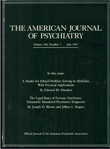TO THE EDITOR: Dr. Halpern and colleagues have no problem with the conclusions of my editorial regarding the importance of separating forensic and clinical functions. They wish to argue a broader point, relating to the foundations of ethics in forensic psychiatry. In doing so, however, I am afraid that they both distort my position and misstate the current status of medical ethics as they apply to capital punishment.
To synopsize an argument that I have developed elsewhere (
1), it is clear historically and analytically that the basic principles of medical ethics are derived from the physician-patient relationship. In that context, unqualified devotion to the interests of patients—encompassing beneficence and nonmaleficence—is the norm. When physicians venture outside the bounds of that relationship, however, different rules often apply. Clinical researchers, for example, may place the advancement of patients' interests second to the production of generalizable knowledge; use of placebos is an instance of this. With proper informed consent, as part of a scientifically valid study, and with efforts made to minimize risks to subjects, this is an acceptable—even commendable—deviation from the norms of the physician-patient relationship. Indeed, to mark the difference, we are careful to call the persons involved in this different kind of relationship “subjects” rather than “patients.”
So, too, for physicians who are performing evaluations for the courts. In the words of the noted medical philosopher Edmund Pellegrino, “The subject-physician relationship [i.e., in the forensic evaluation] does not carry the implication or promise of primacy for the patient's welfare that [is] intrinsic to a true medical relationship” (
2). Were it not the case that the evaluation might, if the facts warranted, result in harm to the subject, there would be no point to it at all. Thus, here as well, the ethical ground shifts under the physician, who for the sake of promoting other socially useful objectives (in this case, advancing justice), is no longer focused on benefiting a particular person. That is not to say that no ethical principles exist to guide the work of a physician performing forensic assessments. I have pointed to truth telling and respect for persons as the ethical underpinnings of forensic work (
1); subsequent commentators may invoke additional principles.
So, in contrast to the assertions of Dr. Halpern and his colleagues, I do not argue for the exemption of psychiatrists who perform forensic functions from the APA Annotations. However, with but a few exceptions, those Annotations have had little to say about work in the forensic realm. The
Ethical Guidelines for the Practice of Forensic Psychiatry of the American Academy of Psychiatry and the Law (
3) are of much greater relevance. Were APA interested in extending the scope of its Annotations to encompass a broader range of forensic issues, the AAPL guidelines would offer a useful starting point.
Now, to what I suspect is the actual motivation for this letter. Dr. Halpern and colleagues—opponents of the death penalty—have been vociferous advocates of the position that psychiatrists should neither evaluate the competence of prisoners to be executed nor treat those found incompetent. Although I am in agreement with them on the latter, I differ on the former, because I believe that their position reflects a fundamental misconception of the psychiatrist's role (
4). As in other forensic settings, psychiatrists are providing information regarding subjects' mental state, with judicial decision makers passing judgment on the implications of those data for the issue at hand. Indeed, one might expect opponents of the death penalty to favor psychiatric involvement, since one of the consequences of psychiatric evaluation may be the postponement, perhaps indefinite, of the sentence of death. Significantly, in contrast to the suggestion in the letter of Halpern et al., both the Ethics Committee of APA (
5) and the Council on Ethical and Judicial Affairs of the American Medical Association (
6) have ruled that participation in these evaluations is not unethical and does not render the physician a participant in the execution.
These are complex issues, worthy of greater attention than can be afforded them in brief correspondence. I look forward to continuing these discussions in other venues.

